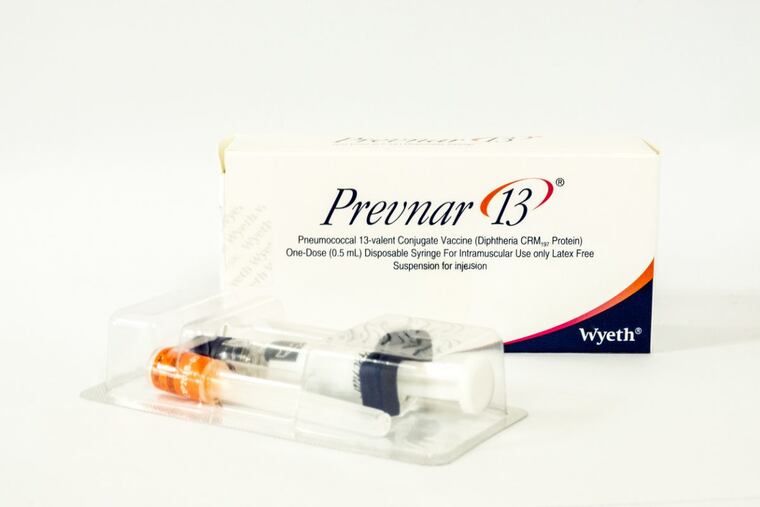The increasing cost of the pneumococcal vaccine: What gives?
Consumers are not likely to feel a pinch from these increases directly. The Affordable Care Act requires that recommended vaccines are covered by insurance, with no cost sharing.

Every November, like clockwork, she gets the same letter, said Dr. Lindsay Irvin, a pediatrician in San Antonio.
It's from the drug company Pfizer Inc., and it informs her that the price tag for the pneumococcal vaccine Prevnar 13 is going up. Again.
And it makes her angry.
"They're the only ones who make it," she said. "It's like buying gas in a hurricane — or Coke in an airport. They charge what they want to."
The Advisory Committee on Immunization Practices (ACIP), a consultatory panel to the federal Centers for Disease Control and Prevention, recommends Prevnar 13 for all children younger than 2 — given at 2, 4, 6 and 15 months — as well as for adults 65 and older.
It protects against pneumonia as well as ear and other infections. Many states require proof that children have received the vaccine in order to attend school.
The vaccine's formulation has remained mostly unchanged since its 2010 federal approval, but its price continues creeping up, increasing by about 5 or 6 percent most years. In just eight years, its cost has climbed by more than 50 percent.
It is among the most expensive vaccines Irvin provides her young patients.
Doctors and clinics purchase the vaccine and then, once they inject patients, they typically recoup the cost through patients' insurance coverage. In most cases there are no out-of-pocket costs.
But the steady rise in prices for branded drugs contributes indirectly to rises in premiums, deductibles and government health spending, analysts say.
A full pediatric course of the vaccine typically involves four shots. In 2010, a single shot cost about $109, according to pricing archives kept by the CDC. It currently costs about $170, according to those archives. Next year, Pfizer says, a shot will cost almost $180.
"Pfizer and other drug companies are raising their prices because they can," said Gerard Anderson, a health policy professor at Johns Hopkins University who studies drug pricing. "They have a patent, and they have a CDC recommendation, which is a double whammy — and a strong incentive for price increases."
The company disagrees — arguing vaccine pricing supports research for new immunizations, along with ongoing efforts to keep products safe and to improve effectiveness. For instance, Prevnar 13's shelf life was extended from two years to three years this year. Pricing also doesn't affect access.
"Thanks to comprehensive health authority guidelines, Prevnar 13 is one of the most widely available public health interventions, supported by broad insurance coverage and innovative federal programs that guarantee access to vulnerable populations," Pfizer spokeswoman Sally Beatty said in an email.
But such arguments don't justify the pattern of "consistent price increases," suggested Ameet Sarpatwari, an epidemiologist and lawyer at Harvard Medical School, who studies drug policy.
"Does that explain what's going on? Probably not," he said. "The onus should be on them to show us why this is needed."
Consumers are not likely to feel a pinch from these increases directly. The Affordable Care Act requires that ACIP-recommended vaccines are covered by insurance, with no cost sharing.
There are other implications, though.
Higher vaccine prices make it harder for physicians to stock up, noted Michael Munger, a family doctor in Overland Park, Kan., and president of the American Academy of Family Physicians.
They have to buy immunizations in advance to provide them for patients. Insurance will eventually reimburse them — typically at cost — but it can take months for that to come through, which is an especially tough proposition for small practices on tight budgets.
"You've got to keep track of your inventory, and make sure you don't have any waste, and are going to get adequate reimbursement," he said. "The cost of vaccines is definitely something in primary care we worry about, because we're on thin margins. … You don't want to provide a service you lose money on, even if it's as important as immunization."
Gardasil, the HPV vaccine, has also seen its price climbing. And, in a similar response, OB-GYNs are providing it in smaller numbers.
A vaccine like Prevnar 13 is harder to make than older vaccines that are much cheaper, said William Moss, a professor at Johns Hopkins Bloomberg School of Public Health who specializes in vaccines and global children's health. It provides immunization for 13 different variations of pneumococcal infection. That makes it a more effective vaccine, but also one that requires greater investment.
Critics, however, note that those investments were made by another company, Wyeth Pharmaceuticals. Pfizer bought Wyeth in 2009, along with the rights to the vaccine.